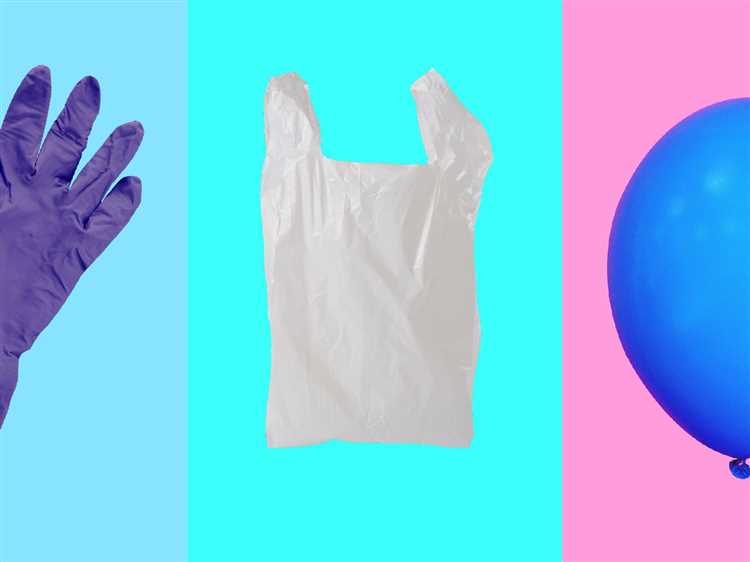
Disclaimer: This article is for informational purposes only and does not endorse or encourage the use of plastic bags as a substitute for condoms. It is essential to prioritize sexual health and safety by using proper contraceptives.
When it comes to safe sex, it is crucial to utilize reliable and effective methods of contraception. Condoms have long been proven to be one of the most efficient forms of protection against sexually transmitted infections (STIs) and unintended pregnancies. However, there are misguided beliefs circulating regarding the potential use of plastic bags as a makeshift substitute for condoms. It is crucial to dispel these myths and emphasize the importance of using proper protection.
Plastic bags, such as those used for grocery shopping, are not designed or tested for use as contraceptives. They lack the necessary qualities and standards that make condoms effective in preventing STIs and pregnancies.
An authentic condom is manufactured from high-quality materials, such as latex or polyurethane. These materials undergo rigorous testing to ensure their efficacy in providing a barrier between sexual partners. Condoms are designed to be strong, flexible, and resistant to tearing during sexual activity. In contrast, plastic bags do not possess these qualities and can easily break or tear, rendering them ineffective in preventing STIs and pregnancies.
Using a plastic bag as a substitute for a condom significantly increases the risk of condom failure, exposure to STIs, and unintended pregnancies. It is essential to prioritize your sexual health by using condoms that meet proper safety standards and are manufactured specifically for this purpose.
Remember, engaging in sexual activity without proper protection puts you and your partner at risk. Always use condoms or other approved contraceptives to ensure your sexual health and well-being. If you have concerns or questions about contraception, consult with a healthcare professional or visit a reputable sexual health clinic that can provide you with accurate information and resources.
Disclaimer: This article is for informational purposes only and does not endorse or encourage the use of plastic bags as a substitute for condoms. It is essential to prioritize sexual health and safety by using proper contraceptives.
- The Risks of Using Plastic Bags as Condoms
- 1. Decreased effectiveness
- 2. Increased risk of breakage
- 3. Irritation and discomfort
- 4. Increased risk of bacterial growth
- Alternatives to Plastic Bags for Safe Sex
- 1. Condoms
- 2. Dental Dams
- Why Plastic Bags Should Never be Used as Condoms
- No Protection against STIs
- Potential for Breakage
- The Importance of Using Proper Contraceptives
- Where to Find Affordable and Reliable Condoms
- Safe Sex Practices and Education
- Importance of Condoms
- Proper Condom Use
- Comprehensive Sex Education
- Question-answer:
- Can plastic bags really be used as condoms?
- Why would someone consider using plastic bags as condoms?
- What are the dangers of using plastic bags as condoms?
- Are there any alternatives to condoms?
The Risks of Using Plastic Bags as Condoms
While it may seem tempting or convenient to use a plastic bag as a makeshift condom, it is important to understand the potential risks and dangers associated with this practice. Using a plastic bag as a substitute for a proper condom can greatly increase the risk of unintended pregnancy, as well as the transmission of sexually transmitted infections (STIs).
1. Decreased effectiveness
Plastic bags are not designed or tested for use as condoms, and therefore do not offer the same level of protection against STIs and pregnancy. Unlike condoms, plastic bags do not have the necessary thickness or composition to effectively block sperm or protect against the transmission of STIs.
2. Increased risk of breakage

Plastic bags are more prone to breakage than condoms, especially during sexual intercourse. The friction and movement during intercourse can cause the plastic bag to tear or rupture, which may lead to unintended pregnancy or increased risk of STIs.
3. Irritation and discomfort
Plastic bags are not designed to be used on sensitive genital skin, and may cause irritation or discomfort. The texture and material of a plastic bag can be rough, abrasive, and potentially damaging to the sensitive tissues of the penis or vagina.
4. Increased risk of bacterial growth
Unlike condoms, plastic bags are not made from latex or other materials that have antimicrobial properties. This means that using a plastic bag as a condom can increase the risk of bacterial growth and infection, leading to potential health issues.
| Risk | Description |
|---|---|
| Decreased effectiveness | Plastic bags do not offer the same level of protection as condoms against STIs and pregnancy. |
| Increased risk of breakage | Plastic bags are more prone to tearing or rupturing during sexual intercourse. |
| Irritation and discomfort | Plastic bags can cause irritation and discomfort due to their rough texture and material. |
| Increased risk of bacterial growth | Plastic bags do not have antimicrobial properties, increasing the risk of bacterial infection. |
It is important to prioritize your sexual health and use proper protection, such as condoms, that have been specifically designed and tested for this purpose. Condoms are widely available, affordable, and offer a high level of protection against both unintended pregnancy and STIs. If you are unable to access condoms, it is recommended to explore other contraceptive options or seek professional assistance from healthcare providers.
Alternatives to Plastic Bags for Safe Sex

While it may be tempting to use a plastic bag as a makeshift condom, it is important to note that this is not a safe or effective method of contraception. Plastic bags are not designed to be used as barriers for protection against sexually transmitted infections (STIs) or unwanted pregnancies.
Fortunately, there are numerous alternatives to plastic bags that are specifically designed for safe sex:
1. Condoms
Condoms are widely available and highly effective in preventing both STIs and pregnancies. They are made from latex or polyurethane and create a barrier between the penis and vagina, reducing the risk of transmitting infections or sperm.
2. Dental Dams
Dental dams are thin latex or polyurethane sheets that can be used as barriers during oral sex. They prevent the transmission of STIs by creating a barrier between the mouth and genitals.
Both condoms and dental dams are readily accessible at pharmacies, health clinics, and online retailers. It is important to always use a new condom or dental dam with each sexual encounter to ensure maximum protection.
Remember, the use of plastic bags as condoms is not safe and can lead to serious health consequences. It is crucial to prioritize your sexual health and use appropriate barrier methods to reduce the risk of STIs and unintended pregnancies.
Why Plastic Bags Should Never be Used as Condoms
Using plastic bags as a substitute for condoms is not only ineffective but also extremely dangerous. While it might seem like a cheap and convenient option in dire situations, it poses significant risks to sexual health and overall wellbeing. Here are a few reasons why plastic bags should never be used as condoms.
No Protection against STIs
Plastic bags are not designed or manufactured to provide protection against sexually transmitted infections (STIs) such as HIV, herpes, gonorrhea, or chlamydia. Condoms, on the other hand, are specifically designed to provide a barrier that reduces the risk of STI transmission. Using a plastic bag as a condom does not offer the same level of protection and puts both partners at risk.
Potential for Breakage
Plastic bags are not made from the same durable materials as condoms. They are more likely to break or tear during sexual intercourse, increasing the risk of unintended pregnancy or STI transmission. Condoms are designed to withstand a certain amount of pressure and friction, ensuring maximum protection. Using a plastic bag as a condom increases the chances of a mishap occurring.
Unreliable Barrier
Plastic bags lack the elasticity and snug fit that condoms provide. They are prone to slipping off or shifting during sex, leaving both partners vulnerable to pregnancy or STI transmission. Condoms are designed to fit securely and stay in place, offering a reliable barrier that minimizes the risk of unplanned consequences.
Conclusion:
While it might be tempting to use a plastic bag as a condom in a pinch, the risks far outweigh the benefits. Investing in proper contraceptive methods, such as condoms, is essential for protecting sexual health. Plastic bags should never be used as condoms as they do not provide adequate protection against STIs and have a higher likelihood of breakage during intercourse. Remember, safety should always be the top priority when it comes to sexual activity.
The Importance of Using Proper Contraceptives
Using proper contraceptives is paramount when it comes to preventing unintended pregnancies and protecting against sexually transmitted infections (STIs). While some may argue that alternatives such as plastic bags can be used as makeshift condoms, it is essential to highlight the importance of using officially-approved contraceptive methods for maximum effectiveness and safety.
Proper contraceptives, such as condoms, diaphragms, hormonal contraceptives (pills, patches, injections), and intrauterine devices (IUDs), have undergone extensive testing and research to ensure their efficacy and safety. These contraceptives have been specifically designed to provide reliable protection against unwanted pregnancies and STIs.
Using makeshift contraceptives, like plastic bags, not only puts individuals at a higher risk of unintended pregnancies but also exposes them to various health risks. Plastic bags are not designed or tested for use as contraceptives and may not provide an adequate barrier against sperm, viruses, or bacteria. The material of plastic bags is not strong enough to withstand friction during sexual intercourse and may tear or break, increasing the chances of pregnancy and the transmission of STIs.
Furthermore, official contraceptives often come with additional benefits that makeshift alternatives cannot provide. For example, hormonal contraceptives can help regulate menstrual cycles, reduce the risk of certain cancers, and alleviate menstrual symptoms. Additionally, condoms offer dual protection by preventing both unintended pregnancies and STIs.
Using proper contraceptives also encourages responsible sexual behavior and open communication between partners. It demonstrates a commitment to both one’s own and their partner’s sexual health and well-being. It is essential to prioritize one’s own safety and that of their sexual partners by using approved contraceptives.
In conclusion, the use of proper, officially-approved contraceptives is crucial for effective protection against unintended pregnancies and STIs. While makeshift alternatives like plastic bags may seem convenient or accessible, they do not provide the necessary level of protection and may pose significant health risks. It is imperative to prioritize one’s sexual health and safety by choosing approved contraceptives and practicing responsible sexual behavior.
Where to Find Affordable and Reliable Condoms
When it comes to safe and protected sex, finding affordable and reliable condoms is essential. Luckily, there are several places where you can find them without burning a hole in your pocket.
1. Local health clinics: Local health clinics often provide free or low-cost condoms. These clinics are a great resource as they offer confidential and non-judgmental services. They can also provide necessary information on sexual health and contraception.
2. Planned Parenthood: Planned Parenthood is a trusted organization that offers a wide range of sexual and reproductive health services, including affordable condoms. They have locations across the country and you can easily find one near you.
3. Online retailers: Many online retailers offer affordable and reliable condoms. These platforms provide a convenient way to browse and purchase condoms discreetly from the comfort of your home. Some popular online retailers include Amazon, Walmart, and the Condom Depot.
4. Drugstores and supermarkets: Drugstores and supermarkets often have a dedicated section for sexual health products, including condoms. You can find a variety of brands and types to choose from. Always make sure to check the expiration date and look for FDA-approved condoms.
5. College or university health centers: If you are a student, your college or university health center may provide free or low-cost condoms. They understand the importance of safe sex and aim to make contraceptives accessible to students.
Remember, using condoms consistently and correctly is crucial for preventing sexually transmitted infections (STIs) and unintended pregnancies. It is always better to be prepared and have a stash of affordable and reliable condoms on hand.
Safe Sex Practices and Education
Ensuring safe sex practices is essential in preventing the spread of sexually transmitted infections (STIs) and unwanted pregnancies. Comprehensive sex education programs play a crucial role in educating individuals about the importance of using proper protection and making informed decisions.
Importance of Condoms
Condoms are a widely recommended method of contraception and protection against STIs. They provide a physical barrier that prevents the exchange of bodily fluids, reducing the risk of transmission. Condoms are easily accessible and affordable, making them an essential tool for safe sex practices.
Proper Condom Use

It is important to use condoms correctly to maximize their effectiveness. Here are some essential tips for proper condom use:
- Check the expiration date before using a condom and ensure it is within the valid period.
- Carefully open the packaging to avoid damaging the condom. Ensure there are no tears or holes.
- Place the condom on an erect penis before any sexual contact occurs.
- Pinch the tip of the condom to leave room for ejaculation and unroll it to cover the entire length of the penis.
- After ejaculation, hold the base of the condom and withdraw the penis while it is still erect.
- Dispose of the used condom properly by wrapping it in tissue or a bag and throwing it in the trash.
These steps help ensure proper protection and reduce the risk of condom breakage or slippage.
It is also important to note that condoms should be used with each sexual encounter, even if another form of contraception is being used. They provide an additional layer of protection against STIs.
Comprehensive Sex Education

A comprehensive sex education curriculum emphasizes the importance of safe sex practices, including condom use. It covers topics such as STIs, contraception methods, consent, and healthy relationships. By providing accurate information and promoting open discussions, comprehensive sex education equips individuals with the knowledge and skills they need to make informed decisions about their sexual health.
It is crucial to prioritize comprehensive sex education in schools, communities, and healthcare settings to empower individuals and promote safe sex practices. By investing in education and resources, we can create a healthier and safer society.
Question-answer:
Can plastic bags really be used as condoms?
No, plastic bags should never be used as condoms. They are not designed or tested to provide the necessary level of protection against sexually transmitted infections or unintended pregnancies. It’s important to always use proper condoms made of latex or polyurethane that are approved by regulatory authorities.
Why would someone consider using plastic bags as condoms?
Using plastic bags as condoms is extremely unsafe and should never be considered. However, some individuals may mistakenly believe that plastic bags can provide protection during sexual intercourse due to their availability and affordability. It’s crucial to educate people about the risks and importance of using proper condoms to prevent the spread of diseases and unintended pregnancies.
What are the dangers of using plastic bags as condoms?
Using plastic bags as condoms can have serious health consequences. Plastic bags are not designed for sexual intercourse and do not provide the necessary protection against sexually transmitted infections (STIs) or unintended pregnancies. The thin material of plastic bags may tear or break easily, increasing the risk of STI transmission and puts both partners at risk. Additionally, the chemicals and toxins present in plastic bags can be harmful when they come into contact with sensitive genital tissues.
Are there any alternatives to condoms?
Yes, there are several alternatives to condoms for contraception and protection against STIs. Some options include hormonal contraceptive methods such as birth control pills, patches, or injections; intrauterine devices (IUDs); diaphragms; and contraceptive implants. It’s important to consult with a healthcare professional to determine the most suitable method based on individual needs and health conditions.